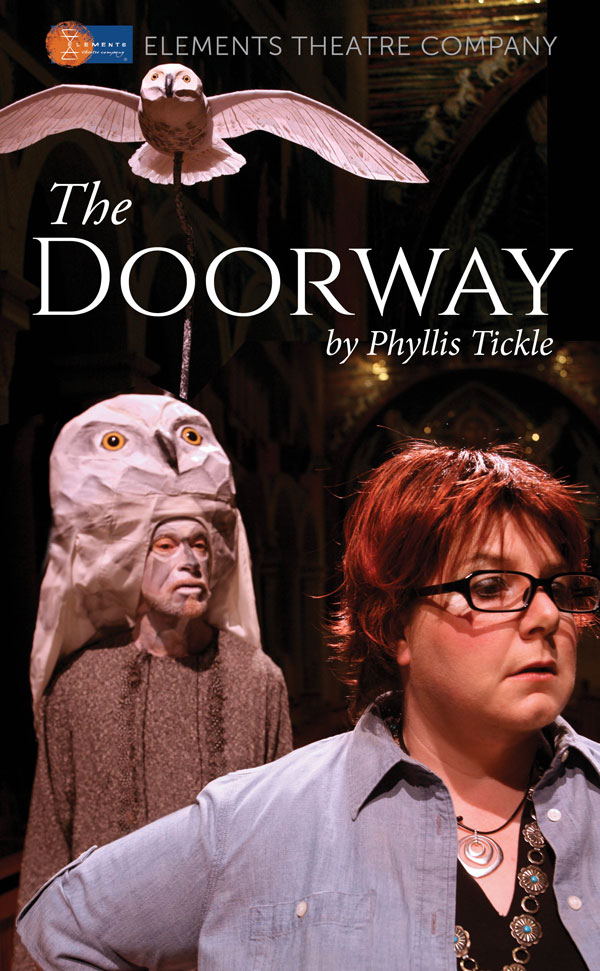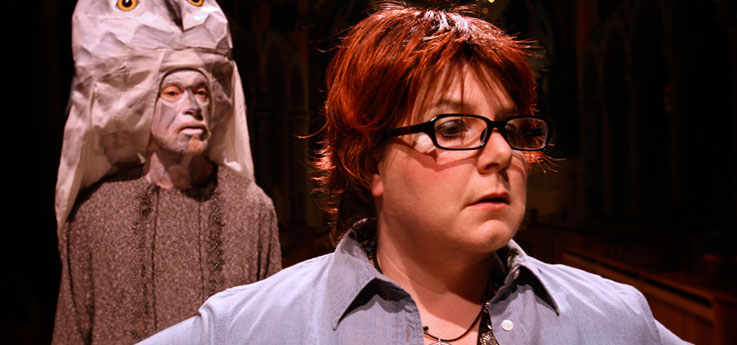
Show Information
From the Director
Show Gallery

The Doorway
By Phyllis Tickle
Summer 2010
Written for the Tenth Anniversary of the Dedication of the Church of the Transfiguration
Set in the dramatic space of the Church of the Transfiguration, The Doorway tells the story of an artist’s experience as she comes to the completion of her work in the church. Nearly finished with her tasks, Madeleine is stumped by the final inscription for a chalice that remains to be carved. Her muse, an owl named Theodore, advises her to call upon the building itself, and the stories recorded in the art there, to help her find the final missing piece that will bring the work to an end. Bridging the real and the fantastic, The Doorway echoes the completion of the Church of the Transfiguration at its Tenth Dedication Anniversary this summer.
FROM THE PLAYWRIGHT:
by Phyllis Tickle
Tell us about the process of creating The Doorway. What was it like to write for this specific playing space?
“When Mother Betty and the Community of Jesus first approached me about this, we were thinking in terms of a piece that would travel—a touring piece. So in terms of liturgical drama, a signatory piece written for one space was not originally our intention, but that is what this became, and hopefully it will be played here every year. It celebrates the structure, enhancing the teaching aspect of the space, but beyond that, it welds or melds the spirit of the people who worship there. This can’t just be done with words; it must be aesthetic and experiential. It’s very close to what happens when a space has been prayed in through the centuries—when you walk in you just get a sense of it.
I went into the church alone three times. Finally, I lay down on the floor on the western side of the ambo, and just shut up for thirty or forty minutes. It had been so long since Jeremiah [Elements performed Ms. Tickle’s Figs and Fury for the Dedication of the church in 2000] I wandered around to see sight lines and things. At first I wanted to use the windows as boxes with shutters for the players to come and go, but this evolved too.
That space is a womb composed of stuff and story. It has its own story, and it wants to tell its own story, not traveling around. That is a defining characteristic or circumstance of a major religious site, and this space demands that recognition. And the doorway of the church itself is the passageway that enables or enhances that storytelling—like the birth canal between the secular and ecclesial world.
One way this particular production differs from the genre as a signatory piece, is the imposition of the set in that space. This is imaginative and ingenious—especially the stairways!”
Can you talk about the birth of the characters?
“I’m in love with Maddy. She’s the lynchpin that makes the whole thing go. She is every artist that ever touched that space, or any other space. She is also fully realized from my affection for Sr. Danielle. While I wrote, it was like my forehead was a screen and I was seeing her the whole time. When you’ve got a company with a really strong actress, you write to that strength.
Then of course—to do this type of “holy” work, you have to have the counterbalance of the fantastical, otherwise it bogs down in the religious and you miss the magic. I believe that religion can’t take itself too seriously—it has to acknowledge the magical. And Brad is the coup de grace—the owl construct he operates is a hoot! The character was written to his strengths. “Theodore” means “gift of God”, and he is the conduit that every artist and space knows in this process.
At the beginning, Sr. Danielle asked for two things. The first was some way to include archetypes, and this led to the depersonalization of characters from the frescos, for example the King and the Whore. She was looking for that “primordial impetus” in telling the stories, and using the archetypes plays perfectly to that.
Secondly, she wanted to involve the Elements—Earth, Water, Fire, Air—and this has really evolved through the process. What the Elements give us is all we’ve got to work with. They began to tell me what they wanted to do and be. Plus it’s a great play on the name of the company.
It’s been wonderful—I love drama and the Community of Jesus. It’s been a pleasure to come and go, and work with the space and the company. You know drama is good if it plays in people’s heads for days afterwards, especially the things they didn’t get. So this will be the test!”

